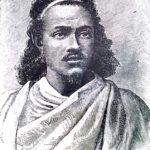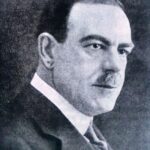LEWIS, SAMUEL
- 5 Min Read
Sir Samuel Lewis (November 13, 1843-July 9, 1903), barrister and member of the Sierra Leone Legislative Council for more than 29 years, was the leading figure of the Krio (Creole) community at the height of its influence. A convinced upholder of the British Empire and even an advocate of the inland expansion of the Sierra Leone Colony, he was at the same time a tenacious defender of the legally established liberties of individual Africans, and of his people as a whole.

PHOTO CAPTION: Samuel Lewis. SOURCE: EA Library.
His parents were Egba recaptives from Nigeria, who were established at Murray Town, in what are now the western outskirts of Freetown, Sierra Leone, in 1828. Within 30 years, William Lewis, his father, like many of his contemporaries had accumulated a modest fortune by trade on the neighbouring coasts.
After attending the Church Missionary Society (C.M.S.) Grammar School, Samuel Lewis assisted in his father’s business until 1886. During the next six years, he studied law in England, being called to the bar of the Middle Temple in 1871.
Soon after returning to Freetown in 1872, he was appointed acting Queen’s Advocate (Attorney-General) for 15 months, and although he later twice acted in a temporary capacity as Chief Justice, he declined offers of permanent government employment to pursue his highly successful private practise. His reputation for mastery of detail and powerfully sustained forensic logic soon won him lucrative briefs from all the British West African colonies. Not all his cases, however, were popular ones.
Several times he prosecuted African notables, the Sierra Leonean missionaries involved in a murder in Onitsha Nigeria, Chief W.T.G. Caulker, Postmaster J.H. Spaine, and once defended a British official charged with the brutal murder of his African servant. But Lewis believed the operation of established processes of British colonial justice would more truly protect the interests of his countrymen than appeals to racial solidarity.
In 1872, as acting Queen’s Advocate, Lewis had taken his seat ex officio in the Legislative Council, but in 1882 he became a permanent unofficial member and worked to develop the limited means by which such members could try to check abuses of power by the governor.
He succeeded in establishing the right of councillors to receive information, debate legislation, propose amendments, and in the last resort to appeal to the Colonial Office. By using to the full these constitutional channels to express his reasoned criticisms of authority, he made the Legislative Council an effective organ for expressing the public opinions of middle-class Freetown. When the financial and frontier policies of Governor Sir Samuel Rowe (terms of office 1877-80 and 1885-88) became unpopular in 1885, Lewis criticised him in council for “going after the chiefs in their own country to beg them for peace.” He added to his verbal criticism by collaborating with other African and European critics of Rowe in the short-lived Sierra Leone Association (a discussion group which sought to exert political pressure). Between 1881 and 1885 he published three pamphlets on Sierra Leonean affairs.
Lewis also played a major role in the establishment of the Freetown Municipal Council, which he regarded as a means of training in self-government, though here he was not fully supported by African opinion, which feared the introduction of rates. In 1895 he became the first mayor of Freetown and was re-elected in 1896. In that year, too, he was awarded a knighthood, the first African to be thus honored by a British monarch.
Although Lewis was proud of his African, and specifically Yoruba, descent, the most important influences in his life seem to have been of European origin, notably the Wesleyan Methodist Church, of which he always remained a devout and fervent member. His support of British imperial expansion was not only because he accepted many of the values he believed the British Empire to stand for, but also because, like his friend Edward W. Blyden, he believed Sierra Leoneans might benefit (not only economically) from association with African peoples further inland, and specifically with the Mandinka empire-builder Samori.
In 1894, he welcomed the advent of a governor, Sir Frederick Cardew, who seemed likely to pursue the vigorous policies of economic development and territorial expansion which Lewis had been waiting for. It soon became clear, however, that the Protectorate established in 1896 was being arbitrarily administered under the influence of military officers, and that the Krios would be prevented from playing any active role within it.
Though lacking any close knowledge of the Mende or Tenne peoples, Lewis was very willing to advise them and to try to secure justice for them in their dealings with the unfamiliar machinery of colonial rule. In 1896 his vigorous pursuit of a land case led to a breach with Cardew, who feared for the consequences if British subjects in the Protectorate were encouraged to claim Sir Sam as their governor.
The hut-tax insurrection of 1898 showed that the Krio community was attracting great hostility and suspicion among Africans in the Protectorate, but still more so in the colonial administration. Cardew, indeed, held Lewis and the Krios generally responsible for stirring up the insurrection.
It thus became clear that many of Lewis’ hopes for the place of acculturated Africans within the British African empire were to be disappointed. He remained a respected figure in Freetown until his painful death from cancer in 1903, but he must have been a disillusioned man. Though his ideas would have little appeal to the nationalist leaders of the future, in his generation he was an African patriot of courage and distinction.
JOHN D. HARGREAVES




